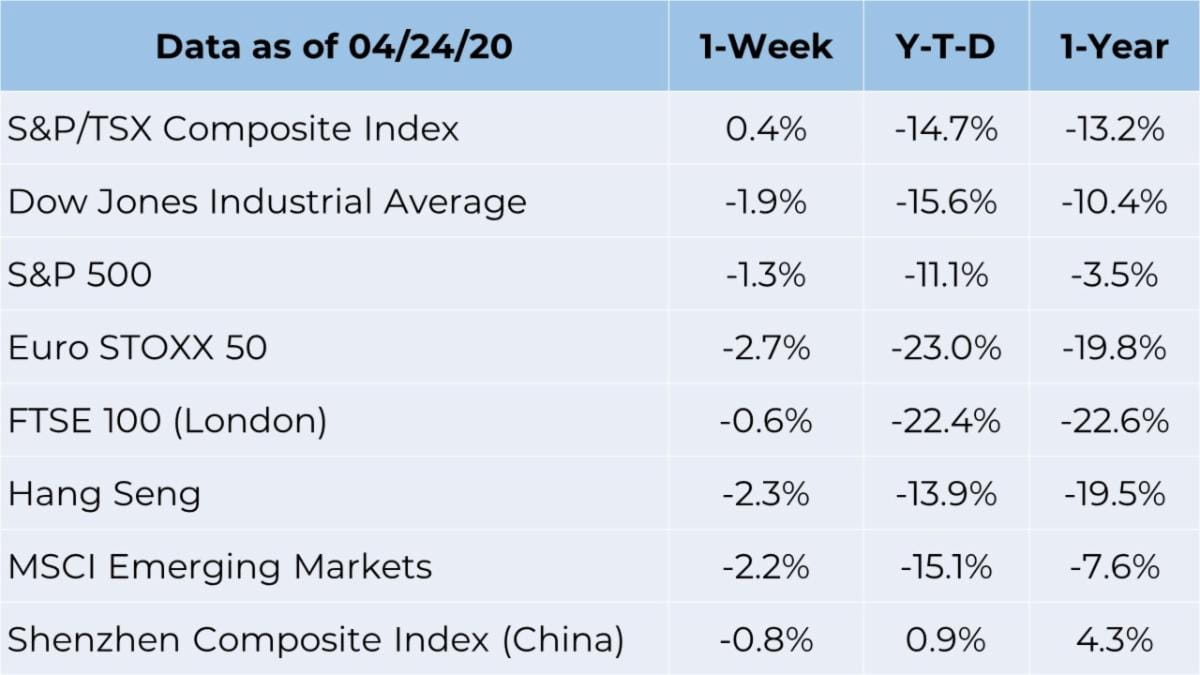Weekly Market Commentary April 29th, 2020
The Markets
We live in interesting times.
There is discussion about whether the saying, “May you live in interesting times,” is a blessing or a curse. At this point in 2020, we all understand why.
Last week, the world watched in consternation as the price of oil, specifically West Texas Intermediate crude oil, dropped into negative territory. The price moved below zero because a purchase date coincided with a lack of storage space. As a result, the owners of the oil had to pay to have it taken off their hands, reported Ben Levisohn of Barron’s.
Oil prices recovered on Wednesday. Global oil producers have promised to reduce output, which would realign supply and demand, but it has yet to happen, reported Evie Liu of Barron’s. The delay may reflect a hope that coronavirus restrictions will ease, economies will begin to reopen, and demand for oil will increase.
Investors were understandably unsettled by oil prices, and North American stocks lost value early in the week. As oil stabilized, these stocks pushed higher. The rebound in stocks stalled on news that trials for a potential COVID-19 treatment had produced disappointing results.
Thursday’s U.S. unemployment data showed 4.4 million people filed for unemployment benefits the previous week. That brought the number of unemployed Americans to more than 26 million, according to Jeffry Bartash of MarketWatch. Statistics Canada is scheduled to release employment numbers in early May, but the situation is likely similar to the U.S.
Earnings, which reflect companies’ profits, remained less than robust, as expected. “The blended (combines actual results for companies that have reported and estimated results for companies that have yet to report) earnings decline for the first quarter is -15.8 percent...” reported John Butters of FactSet.
If you have any concerns about your investment portfolio or current market conditions, please don’t hesitate to contact us.

Source: Refinitiv
Stay-at-home spending
Forum Research recently released the results of an employment poll, suggesting that more than half of Canadians have had a change in employment status since the pandemic begun. However, if you are lucky enough to still be working, or remain financially comfortable, think carefully about how you want to spend your excess funds. The money could be used to improve your long-term financial outlook or provide support to people in need. For instance, you could:
- Contribute to an emergency fund. It’s a sound idea to have savings equal to three to six months of expenses in a rainy-day fund in case something unexpected happens, such as a coronavirus quarantine.
In 2019, an Angus Reid poll reported that just over half of Canadians – 53 percent – were living paycheque to paycheque, and would not be able to deal with sudden unexpected expenses. - Pay off high-interest rate debt. If your income is secure, using extra funds to reduce high interest rate debt may be a good choice. With many credit cards charging around 20 percent interest, paying off credit card debt can result in much lower interest payments over time, and thus more disposable income.
- Support local businesses. Many local businesses are struggling, even with government support. Even if you aren’t leaving your house, many local retailers are moving online, and online meal delivery services allow you to order from your favourite local restaurants without needing to directly interact with anybody.
Weekly Focus – Think About It
“Do you think you remember a movie in which a knight gallops toward a castle just as its drawbridge is going up, and his white horse jumps the moat in one glorious airborne leap?
…we’re that rider. Chasing us is the dreaded coronavirus. We’re in midair, hoping we make it to the other side, where life will have returned to what we think of as normal. So, what should we do while we’re up there, between now and then? Think of all the things you hope will still be there in that castle of the future when we get across. Then do what you can, now, to ensure the future existence of those things.”
--Margaret Atwood, Time Magazine, April 16, 2020
Best regards,
Eric Muir
B.Comm. (Hons.), CIM®, FCSI
Portfolio Manager
Tracey McDonald
FCSI, DMS, CIM®
Portfolio Manager

